You spend nearly a third of your life asleep. During that time, your body does more than rest; it repairs cells, stores memories, and helps prepare you for the day to come. It’s no wonder that sleep is essential for our overall health. The difference between excellent and poor sleep is like night and day. The effects of sleep deprivation go beyond making you feel tired. After a night of poor sleep, we have trouble focusing, remembering things, and making quick judgments.
The Effects of Sleep Deprivation in Later Life
In this article, we’re going to explore how sleep benefits our bodies and what might happen if you don’t get enough of it:
The Sleep Cycle
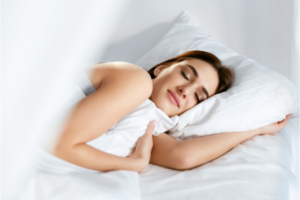
First, we’re going to explore what a healthy sleep looks like.
There are two main factors to consider here: Sleep duration and sleep quality. Even if you sleep for 8 hours, you can still wake up feeling tired if your sleep is interrupted frequently or isn’t very deep.
There are four sleep stages, which are as follows:
Stage 1 (N1): As you enter sleep, you might still be aware of your body, but you’ll slowly relax into sleep. People often twitch their muscles during this stage and are easily awoken by noises or movements.
Stage 2 (N2): Sleep begins to deepen as the breathing slows, muscles relax, and temperature decreases. During an entire night of sleep, the average person spends 50% of the time in the N2 stage.
Stage 3 (N3): The bodily changes noted in the N2 stages will deepen; the person is even harder to wake up, and their breathing rate gets even slower. This is the stage where the body repairs itself and commits the day’s events to memory.
Stage 4 (REM sleep): This stage is the most well-known, perhaps because it’s when we experience the most intense dreams. Rapid eye movement sleep takes place after we’ve been asleep for ~1 ½ hours; in total, you spend a quarter of your sleeping time in the REM stage.
While you sleep, you cycle between these different states. A long, complete sleep allows your body to spend adequate time in each stage.
How Sleep Affects Your Body & Brain
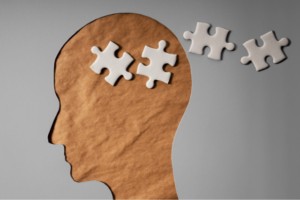
Now that you understand how sleep works, it’s easier to see the connection between sleep quality and your overall health, especially for older adults. As we age, we notice declines in our cognitive abilities and immune functioning that poor sleep will only exaggerate.
The owner of Right at Home in Winnipeg writes, “Aging is about more than staying healthy and safe. It’s about living well. Getting enough sleep plays an important role in that.”
We’re going to take a closer look at how chronic sleep deprivation affects your day-to-day life as a senior:
Memory

While we sleep, we consolidate the day’s memories, which helps us remember information and learn new skills. Without that essential process, we have a more challenging time retaining new information.
This is especially important for those with neurodegenerative diseases, including Alzheimer’s. Without enough sleep, it’s even harder to recall memories.
Immune system
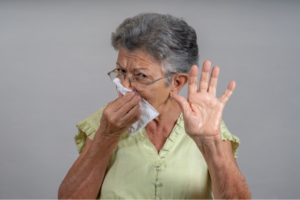
Your immune system is designed to protect you from infections and viruses. Sleep deprivation has been shown to compromise the immune system and reduce the body’s ability to produce virus-fighting antibodies. This affects things like your heart health, risk of obesity, and developing diabetes.
For an older adult, a compromised immune system is dangerous. Viruses and colds can make them sick, and they’ll have a more challenging time recovering from them.
Mental health
Did you know that poor sleep can lead to feelings of depression and anxiety? Older adults may already be dealing with social isolation; when feelings of depression are intensified, it can worsen their mental state.
Cognitive ability
A night of poor sleep leads to difficulty focusing and reacting. This can affect you in situations like:
- Making snap judgments when driving or crossing the street
- Performing at work
- Cooking a meal at home
4 Ways To Improve Your Sleep Quality
You know how harmful poor sleep can be. What can you do to improve the quality of your nightly rest?
1. Massages
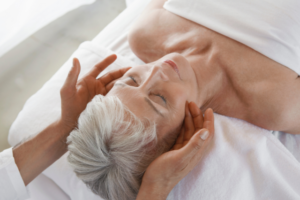
It’s hard to relax and fall asleep when dealing with aches and pains. Consider scheduling deep tissue massages to address those issues. It will help your body feel better, but it can help you sleep, too. The owner of Fit4Life Physiotherapy writes, “When you take better care of your body, it takes better care of you.”
Sore joints make it difficult to fall asleep. Try booking an evening massage to help relax your body before bed.
2. Treatments for sleep disorders
Are you concerned that you may be suffering from a sleep disorder such as sleep apnea, insomnia, or narcolepsy? We recommend contacting a medical professional to request a sleep study. Once you’ve been properly diagnosed, you can identify a treatment plan that will help improve your sleep quality.
3. Avoid alcohol
Consuming alcohol (in excess or small amounts) has been linked to decreased sleep quality. It may cause you to have a lighter or shorter sleep overall. Limit your alcohol intake to improve your sleep quality.
4. Sleep hygiene
Do you have a bedtime routine? By sticking to a regular sleep schedule, you can help your body fall asleep faster.
Here’s our advice for maintaining great sleep hygiene:
- Set your alarm for the same time each morning. Aim to be in bed by the same time each day.
- Don’t eat right before you go to sleep.
- Keep electronics out of the bedroom.
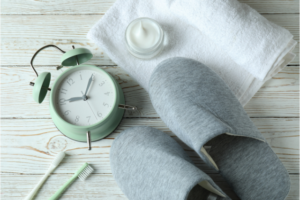
When you make a habit of sleep hygiene, the routine will signal your body when it’s time to sleep.
A few habits are counterintuitive to your sleep hygiene.
Have you noticed how the bright light from a smartphone makes you feel awake? Blue light can suppress the production of a hormone that makes you sleepy (melatonin).
On top of that, the stimulating texts and posts you see can create feelings of anxiety or excitement; you might find yourself staring at the ceiling instead of falling asleep.
So now you have a deep understanding of the effects of sleep deprivation and how it can impact your daily life. If you’re sleep-deprived, it affects your immune functioning, mental health, and cognitive abilities. Seniors may notice that these side effects are even more impactful. We hope this guide helps you create a bedtime routine that’s consistent and beneficial to your health.

